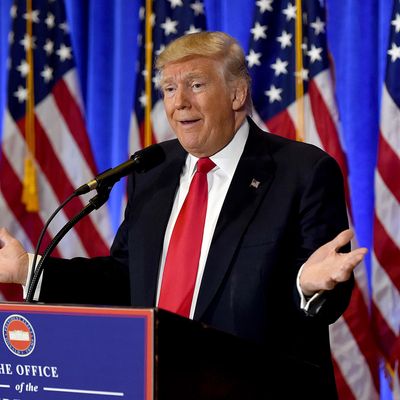
Yesterday, President-elect Donald Trump, in an interview with the New York Times, threw all sorts of sand into the gears of the congressional GOP effort to repeal and replace Obamacare. As Jonathan Chait explained, what he was saying made absolutely no sense:
Trump stated that the Senate must repeal Obamacare “probably some time next week,” and that “the replace will be very quickly or simultaneously, very shortly thereafter.” That is completely impossible. It takes months to design a comprehensive reform plan for one-seventh of the economy, even if you have a party committed to a shared vision. And Republicans aren’t remotely committed to a shared vision: They’re promising wildly different things, from covering everybody (a promise they have no way to pay for) to a bare-bones dog-eat-dog free-market system where the poor and sick are mostly left on their own.
So unsurprisingly, at today’s bizarre press conference, the first he has held since being elected president, Trump was asked to restate his basic views on how Congress should deal with Obamacare. And he responded with a somewhat different but equally screwed-up scenario:
We’re going to be submitting, as soon as our secretary is approved, almost simultaneously — shortly thereafter — a plan. It will be repeal and replace. It will be, essentially simultaneously.
It will be various segments, you understand but will most likely be on the same day or the same week — but probably the same day — could be the same hour. So we’re going to do repeal and replace — very complicated stuff. And we’re going to get a health bill passed — we’re going to get health care taken care of for this country.
The new criterion Trump threw into the mix is that nothing at all will happen until Tom Price is confirmed as secretary of HHS. Price has to go through two confirmation hearings. The first is on January 18, at the Health, Education, Labor, and Pensions Committee. The second and “voting” committee on his confirmation is Finance, which hasn’t even scheduled a hearing. But the Senate is voting on amendments to the basic blueprint for Obamacare repeal right now; final passage in that chamber will probably occur tomorrow after votes today and tonight on literally more than a hundred amendments that could shape the repeal. If Trump thinks nothing should happen for weeks, he should have probably shared that sentiment with congressional Republicans, who have been talking for months, publicly and privately, about moving on Obamacare before Trump’s inauguration.
Beyond that new problem, Trump is also suggesting “we” will be “submitting” a “plan” for the whole set of problems. Who is “we?” HHS? The White House? The Republican Party? That’s unclear. Again, if he has policy preferences he has not yet shared with congressional Republicans, why aren’t they awaiting them obediently?
Finally, Trump went out of his way to confirm some of the craziness from the Times interview. “Repeal” and “replace” will happen “most likely on the same day or the same week — but probably the same day — could be the same hour.” Surely someone has told him by now that anything worth calling a “replacement” for Obamacare, with its many insurance regulations and other non-budget features, cannot be done via a budget measure, and thus will require 60 Senate votes. How is that going to happen? It won’t if it resembles any of the plans that Republicans are currently discussing.
Now maybe Trump is alluding to some talk from Paul Ryan about handling repeal and replace “concurrently” — which seems to mean including a few budget-germane elements of a replacement in a bill that repeals Obamacare. According to one report, that eternal conservative policy hobbyhorse, Health Savings Accounts (HSAs), could get some new money as a sort of down payment on a replacement plan that could be part of a package that needed no Democratic votes.
If HSAs are to represent the “replacement” that’s not delayed significantly, Trump may have created another problem in today’s press conference in a complaint about Obamacare:
You have deductibles that are so high that after people go broke paying their premiums, which are going through the roof, the health care can’t even be used by them because the deductibles are so high.
HSAs are a central part of a standard conservative health-care-policy scheme encouraging “personal responsibility” for routine medical expenses. That means paying for them not through insurance, but through out-of-pocket spending supplemented by HSAs. High deductibles and other cost-shifts from insurance companies to consumers are indeed a major complaint you hear about Obamacare. But the problem is going to get a lot worse under any GOP replacement plan we have seen so far.
All in all, Trump advisers might want to convince him to keep his mouth shut about Obamacare until they are on the same page as their alleged Republican allies. Right now, repeal-and-replacement planning is an out-of-control wildfire on which the president-elect is pouring gasoline.






























